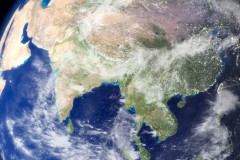 The centres will focus on five areas: climate, water, space technology for disaster mitigation, green technology and biotechnology. Each centre will offer a range educational and training opportunities for scientists and engineers from the developing world, with the goal of advancing research, exchanging knowledge and building global networks.
The centres will focus on five areas: climate, water, space technology for disaster mitigation, green technology and biotechnology. Each centre will offer a range educational and training opportunities for scientists and engineers from the developing world, with the goal of advancing research, exchanging knowledge and building global networks.
"I believe that CAS-TWAS Centres of Excellence would be in a key position in conducting training, joint research cooperation and policy studies and will function as a powerful arm of TWAS in achieving its missions", said Bai Chunli, president of both CAS and TWAS. "The success of those centres will rely on the active involvement and contributions of TWAS members, its young affiliates and the five TWAS regional offices.
"TWAS will continue its endeavours to revitalize and strengthen the TWAS Centres of Excellence to promote the strategic studies in key areas with significant importance to the developing countries," Bai added. "In doing so, it will continue to build research cooperation among developing countries as well as South-North cooperation."
TWAS executive director Romain Murenzi welcomed the new initiative as an "extraordinary opportunity" for addressing regional and global challenges. He said the new investment reflects China's growing contributions to science capacity in the developing world.
"The five centres of excellence can very quickly make an impact on critically important issues such as water, environmental protection, and preparation for natural disasters", Murenzi said. "Within a short period of time, literally hundreds of scientists from the developing world will be able to visit one of the centres in China and take highly valuable knowledge back to laboratories, classrooms and policymakers in their home countries."
Over the next three years, CAS has pledged to invest USD6.5 million in the five centres, with funds flowing to workshops, training, PhD programmes, starting up joint research projects, strategic study reports, and the staff to support them. The five were selected from among 22 CAS-TWAS Centres of Excellence "based on a peer-review of their previous cooperation with TWAS and other developing countries, and the merits of research capacity", Bai said.
The 22 CAS institutions are among the more than 100 centres in the South collaborating with TWAS under the TWAS-UNESCO associateship scheme. The TWAS scheme allows researchers from developing countries to make two visits (of two-three months each) to these institutions during a three-year appointment.
The new Chinese Academy of Sciences investment follows a major agreement in February under which up to 140 early-career scientists per year from the developing world will travel to China for PhD study and research. Bai assumed the presidency of TWAS in January.
Since its founding in 1949, CAS has grown to include two universities, 117 institutes, more than 100 national and state key laboratories, 200 engineering research centres and about 1,000 field stations throughout China. Its staff numbers more than 60,000. CAS and TWAS have long had a close and productive relationship, often involving TWAS's Regional Office for East and Southeast Asia and the Pacific
Each of the five centres of excellence that are targeted for new funding is based at existing institutes of the Chinese Academy of Sciences:
- The Centre of Excellence/International Centre for Climate and Environment Sciences (ICCES) is hosted by the CAS Institute of Atmospheric Physics (IAP). ICESS already hosts 40 research professors and more than 60 ongoing research projects and has cooperative ventures with the United States, Europe, Australia, Canada, Japan, Korea, Thailand, and Pakistan. It focuses on global climate and environmental sciences, as well as cooperation to provide technology support, capacity building and talent training for developing countries. The centre is directed by Lin Zhaohui.
- The Water and Environmental Centre of Excellence is hosted by the CAS Research Centre for Eco-Environmental Sciences (RCEES). The host centre includes three state key laboratories and has more than 60 research professors, including elected members of CAS, TWAS and the Chinese Academy of Engineering. The goal of the centre is the transfer of technologies and experiences accumulated in China to the other developing countries, and to support improved environmental quality and sanitary conditions in those countries. The CAS-TWAS centre is directed by Yang Min.
- The Centre of Excellence on Space Technology for Disaster Mitigation, based at the CAS Institute of Remote Sensing and Digital Earth. The centre will conduct research on disaster mitigation through advanced space technologies, especially space-borne Earth observation technology; it will provide knowledge transfer in developing countries through joint research, education, training, workshop and advisory services. The director is Guo Huadong.
- The Centre of Excellence on Green Technology, based at the CAS Institute of Process Engineering. The centre has more than 70 academic, research, technical and administrative staff, including postdoctoral and postgraduate researchers and visiting scientists from industry and overseas universities. The centre is well-equipped with first-class analytical devices, including a high-performance supercomputing system, a virtual process engineering platform, and a cold field scanning electron microscope. The centre is directed by Zhang Suojiang.
- The Biotechnology Centre of Excellence, based at the CAS Institute of Microbiology. The centre's mission related to developing countries falls into four areas: hosting postgraduate students and visiting scholars; organizing training courses, conferences, symposia, and workshops; coordinating international R&D projects; and strategic intelligence analysis for biotech development. The centre is directed by Li Yin.
The centres will operate under the Division of International Organizations Programs in the CAS Bureau of International Cooperation, directed by Wang Zhenyu, and the TWAS Programme Office, directed by Peter McGrath.
For further details, see the summary of the missions and work plans at the five CAS-TWAS Centres of Excellence.
Edward W. Lempinen

